- Home
- Jay Bonansinga
Shattered Page 12
Shattered Read online
Page 12
Grove realized he had blown it.
That’s when he saw the object on the sidewalk.
At first, glimpsing it out of the corner of his eye, he thought it might be a dead animal, a squirrel or a raccoon flattened by a taxi, but upon closer inspection, he realized it wasn’t animal or vegetable. He gaped at it. He shoved his gun behind his belt, and quickly plucked a pair of rubber gloves from his back pocket.
He knelt down by the pile of fabric, pulled a pen from his vest, and carefully lifted the thing up for a closer look. He stared at it. And stared at it.
“What the hell?”
He shoved the shirt inside his vest, and continued on down the deserted sidewalk.
A block west of there he found another pile—a wadded pair of pants; black denim, 36-inch waist, threadbare. He folded the pants and shoved them inside his vest next to the shirt. A block and half farther he found the assailant’s footwear: a pair of black leather cowboy boots with pointed steel toes. Grove stood there for a moment, gazing at the shabby boots. What the hell was going on?
The man’s underwear lay half a block west of there. Grove forgot all about his stiff legs, his skinned knees, his aching lungs, his ringing ears, and the coppery taste of blood in his mouth. Sirens were closing in. Grove stared at the underwear.
A cascade of thoughts streamed through Grove’s mind. The clothing would yield a bumper crop of DNA. The chances of matching a logical candidate seemed more than likely now—the behavior alone would add reams of pages to the case files. Plus: How far could this lunatic get, walking around naked as a newborn? This notion instantly flooded Grove’s brain with another wave of troubling, half-formed possibilities. Was it a trick? Was there a deeper symbolism here? Did it have something to do with Factor X? And the worst part: If and/or when the man was apprehended, there was still no guarantee that he would lead them to the Ripper.
Grove pulled his radio out. “Base, this is Grove. You copy?”
Static sizzled out of the speaker for a moment. “Geisel here, talk to me.”
“Tom, I lost him.”
Pause. “Where the hell are you? I warned you about this cowboy routine.”
“Tom, listen to me—”
“How many times do I have to tell you, Sport,” the speaker squawked, “you are not Tactical. I cannot afford to go through another New Orleans.”
Grove thumbed the button and said as calmly as possible, “I’m just east of downtown. Cannery district. But there’s something else. We’re gonna need to get a bulletin out on this guy. Right away. Redline it.”
“Already on top of it,” the voice crackled. “Got a good, clean image of the prick. We’ll get him. Get your ass back here. We’ve got a casualty, and you’re gonna need to be in Q&A all day tomorrow.”
Grove swallowed hard, then thumbed the send button, and calmly told the section chief about the perp’s clothing strewn along the road like the shed skin of a snake.
There was a long pause on the other end. At last, Geisel’s gravel-throated voice returned: “What is it with you and these freak-show cases?”
Grove let out a sigh, and started to answer, when a scream rang out.
Grove froze.
The voice from the walkie-talkie crackled: “What was that? Grove? What was that noise?”
The noise had come from the west, rising above the sirens, a shrill, piercing keen that instantly raised Grove’s hackles. He shoved the radio in his vest pocket, drew the .44 from his belt, cocked the hammer, and started westward, jogging along the sidewalk with both hands clutched around the grip. His jaws throbbed with pain.
“Grove? What’s wrong?”
The muffled sound of Geisel’s voice served as a weird counterpoint as Grove moved faster and faster toward the sound. The scream had already started to dissipate. It seemed to be emanating from the shadows of a narrow alley a block away. Grove raised the gun as he approached. His ears still rang, but he had good enough hearing to make out mewling noises coming from the alley.
“Goddamnit, Grove! Answer me!”
Grove paused outside the alley, pressing up against the adjacent brick wall, wrapping his finger around the trigger, taking steady, deep breaths. Sobbing noises echoed within the alley. The sirens rose and wailed. A nearby street lamp threw a jagged beam of light in to the alley.
With one fluid movement Grove swung around in front of the alley and aimed the gun.
“Grove?”
He saw the assailant’s handiwork on the ground by a stack of broken pallets.
“Grove?”
He saw the source of the screaming, and he let up on the trigger.
EIGHTEEN
The gruesome contents of the alley registered in Grove’s midbrain in stages. The woman to the left was alive, on her knees, fully clothed in the squalid rags of the homeless, her stringy hair dangling across her filthy, grease-stained face. Probably in her fifties, but now appearing much older, she was the one who had screamed, her raw, parboiled eyes averted now like a punished child’s. The woman on the right was either dead or very close to expiring.
“L-ll-look at her eyes,” moaned the homeless gal on the left, her face trembling.
Grove moved in. “It’s okay, I’m FBI, it’s okay, stay back, ma’am, stay back now.”
“Oh, l-ll-look at what he done to her eyes…oh sweet Jesus, Jesus!”
“It’s okay, stay back now.” Grove knelt down by the woman on the right. There was nothing he could do. He still had his rubber gloves on so he felt for a pulse. Nothing. The nude wreck of a woman had been hastily assaulted, stripped of her clothes, and then mutilated. She lay in a pool of her own blood, still so fresh it was steaming in the wee hour chill. She looked to be in her midsixties, maybe a prostitute, maybe just a street lady; it didn’t really matter.
Grove’s brain reeled. This made no sense. Hit men did not behave this erratically. Private contractors might be nasty, but they weren’t psychopaths. Grove looked at the dead woman’s face. Her eyes were gone, removed quickly, with very little finesse, leaving behind two sockets of red pulp. Twin rivulets of blood ran down her face, dripping off her chin.
Grove turned to the lone survivor. “We’re gonna get help right away, sweetheart. Can you tell me your name?”
“D-doris.”
“Doris. Okay. You saw the man do this, Doris?”
The homeless woman nodded.
“Was he naked? Was the man naked?”
Another nod.
The sirens had almost reached them, the keening wail penetrating the alley. Grove rose on unsteady legs. He found the radio and thumbed the call button. “Tom, it’s me. You copying this?”
After a moment of static, the voice crackled: “Chrissake, it’s about time! What the hell is going on?”
Grove stared down at the nude, crumpled remains of the homeless woman. His voice softened. “Scratch that last transmission, Tom.”
Through the speaker the voice asked him what the hell he meant by that.
Grove let out a pained sigh. “I don’t think our boy’s naked anymore.”
The next morning, in a quiet suburb of St. Louis, Missouri, Helen Splet stood in her damp, moldy basement laundry room, tears burning her eyes, as she worriedly ironed her husband’s oxford-cloth shirts, ruminating on his whereabouts. Henry had called on Monday evening from the station, claiming that he had to work all night on a bunch of WJID public service announcements. He had told her not to wait up for him. But that was two days ago, and now the kids were starting to ask questions. Where’s Daddy? When is he coming home? Helen had been telling them he was on assignment for the station, a big news story that required all the camera operators to work overtime. But she wasn’t sure how long this ruse was going to keep the children placated. Caleb suspected something was wrong. And little Ethan had cried himself to sleep last night. Now Helen was getting desperate. Nobody at the station knew where he was, and the private investigator whom Helen had hired last year to confirm her suspicions that Henry was havin
g an affair had come up with nothing.
Helen sprayed starch on another collar, dragging the iron, spitting and hissing, across the fabric. The house above her was as quiet as a coffin. Caleb and Rachel were both at school, and Ethan was at a playdate over at the Wilkinsons’. Helen felt the loneliness pressing down on her.
She wondered if she should pray harder. She tried not to bother Jesus with trivial matters such as her arthritis, or Ethan’s day care, or the over-drawn bank account, or Rachel’s braces. But this was different. This was her marriage. This was her family’s future. If her husband was having an affair, then she and the Lord would deal with that. But the uncertainty was killing her, these disappearances tearing her apart inside. She had to know. She had to know the truth, and she asked Jesus Christ, her Lord and Savior, on a daily basis, to keep her strong, to keep her focused on her family.
Hanging the last of the oxford-cloth shirts on a wire hanger above the old iron sink, Helen decided to pray once again for strength. She wiped her eyes and took a deep breath. But just as she was kneeling down on the cold cement slab to talk to the Lord Jesus, the phone rang upstairs.
She sprang to her feet, then hurried up the steps. She figured she better answer it in the unlikely event that it was Henry. She crossed the kitchen and grabbed the receiver on the fourth ring. “Hello,” she said, her voice sounding wooden and falsely hopeful to her own ears.
The flat baritone on the other end was familiar. “Mrs. Splet?”
“Yes?”
“It’s Ray Reinhardt again, ma’am. Sorry to bother you. Do you have a second?”
“Oh. Yes. Mr. Reinhardt, what is it?”
Helen’s stomach tightened. Reinhardt was the St. Louis investigator whom Helen had been paying a hundred and fifteen dollars an hour plus expenses, off and on for over a year now, to get to the bottom of her husband’s mysterious behavior. Helen had talked to the man yesterday morning when her husband had not come home, but Reinhardt had offered no help.
“Mrs. Splet…um…this is going to sound kind of odd,” the voice said.
“Odd?” Here it comes, Helen thought. Please, Lord, help me be strong.
“Yeah, um, look.” Reinhardt sounded hesitant, uneasy. “This is highly unusual, a case like this.”
There was a pause.
Helen gripped the receiver tighter. “Mr. Reinhardt, is my husband having an affair?”
Another pause. “You know…it might be easier if we sit down face-to-face. Any chance we could meet today?”
Helen swallowed the taste of acid in her mouth. “Mr. Reinhardt, I asked you a question. Now, is he or is he not seeing someone?”
“Ma’am…there’s something you need to know. But it’s way too complicated to tell you over the phone.”
“I don’t…I don’t understand.”
“Ma’am, is there any way you could come by my office today? There’s something you really need to know about your husband.”
Helen licked her lips. “All right, fine. I have to pick up the kids from school first. Then I’ll try to get a neighbor to babysit.”
Grove spent the balance of that day at Quantico, the sprawling Virginia campus situated about thirty miles south of Alexandria, on a hundred wooded acres, which served as the central headquarters for the FBI. Most of the day was spent in meetings with bureaucrats. The endless procession of stoic Justice Department men in suits sat across from Grove in white acoustic-tile rooms, asking the same questions about who authorized the trap, and why wasn’t Grove in the WITSEC program with the rest of his family where he belonged, and what evidence did he have that this assailant had anything to do with the Mississippi Ripper. Grove took it all in stride, dutifully telling them what they wanted to hear.
By dinnertime, he had run the entire gauntlet, and had finally stolen away to his private little corner of the BSU office.
His cubicle was next to a window overlooking the tree-lined campus. A cluttered warren of bulletin boards, light tables, and haphazard stacks of files, the office, at first glance, seemed better suited for an overworked actuary or film lab manager than a senior profiler with the FBI (a famous one, at that). The swivel chair was tattered and squeaky, the old Steelcase desk slumping with the sediments of past cases. Many of the black-and-white photos tacked to the corkboards were of mutilated corpses, scourged faces, eyelids mangled or ripped away. All that misery, all those bereaved families.
Both of Dina Louise Dudley’s parents were still alive, as well as her sister and ex-husband. Jennifer Quinn had a five-year-old son. Both of the nurses came from big families. These wrongful deaths would haunt the generations, they would scar entire extended families. Murder is viral. Especially motiveless serial murder. Pain and survivor guilt and ceaseless grief and soul-deep trauma would haunt these families for decades. Something had to be done. The universe insisted upon it—a response.
Lab results had determined that the substance on Dina Dudley’s cheek was indeed Perfluoron, or artificial tears. The makeshift ophthalmic procedures, the involvement with the eye area, the obsession with watching—all of it would eventually lead the FBI to the Ripper. But something was wrong. Somehow the puzzle pieces did not quite fit. Something kept nagging at Grove, something just beyond the reach of his conscious mind.
The hitter who had come after Grove—this cowboy lunatic bent on destroying Grove and his family—he had left a message. The gouged eyes of the homeless woman were no mere coincidence. Had the Ripper ordered such mutilations? Was it part of another elaborate ritual? In the back of Grove’s mind, deep in the tangled synapses of his lower brain, he sniffed a familiar stench. It reeked of decay, the dry stink of the grave, the odor of ancient shrouds and ceremonies and black magic. It strummed some buried chord in Grove, like a tuning fork vibrating at a subsonic level, and it triggered feelings and sensations beyond logic, beyond physics, beyond the mundane protocols of psychological profiling.
Grove was thinking about Maura and Aaron—stranded somewhere to the west, at this very moment, in some innocuous community, the identity of which even Grove was unaware—when he noticed a rectangular box on his desk that hadn’t been there the day before.
“What’s this?” Grove picked it up and looked at the address label. It was the standard red, white, and blue overnight postal box, dated yesterday, the return address written in the flowery script of his mother: 7716 Lawrence Avenue, Chicago, Illinois 60617.
It weighed very little in his hands. He hurriedly tore open the perforated strip and looked inside. Something flat and papery was wrapped in tissue. A small watermarked note fell out. He looked down at it.
The message bore Vida’s distintive, careful hand:
My Dear Baby Boy,
On my way home yesterday I felt a change of heart. You asked me for help, and now I present you with the most powerful uzuri of them all. Many times you have heard me speak of your troubled birth. You were, as the shamans say, a caulbearer. I have never shared this with you until now. When you came out of me, you wore a veil, a part of me, over your face. A child born with a caul has a special destiny. They have the sight. Use it, as you were born with it, Uly. But use it wisely for it can reach places best left unreached. I love you, Uly. I pray for you.
Grove read the note a second time before once again peering inside that box as though it held something that might bite. He pulled the tissue-wrapped object out of the carton, pushed his files aside, and laid it on the desk blotter. Then he carefully peeled the paper away.
At first glance it looked like a deflated bladder, or a purse of ancient linen from some musty display case in some esoteric old museum. It was the color of old parchment, and marbled in delicate intertwining capillaries that were long dried and desiccated into blackened threads. Grove found a fold along one edge and spread it open like the seam of an enormous pita. The caul had apparently been stretched and tanned. It smelled of alkaline and old cinnamon.
Somewhere in the back of his mind Grove recalled reading about this little-known anomal
y of childbirth.
The amniotic sac envelopes all fetuses and usually breaks free during labor. But in rare cases—something like one tenth of one percent of all births—this thin, almost transparent membrane covers the face of a newborn like a fleshy mask. The phenomena has inspired a large body of folklore. In Victorian times sailors took dried cauls with them on long voyages as preventives against shipwrecks and drowning. Cauls were used for centuries to heal, to conjure, to tell the future in arcane potions.
Grove carefully folded the membrane, put it back in the tissue, then slid it back into the mailing box.
As the dying light threw long shadows through the dusty blinds flanking his cubicle, and the raw Virginia sky, just visible at the top of the window, turned the color of ash, Grove leaned over the table and punched the intercom button on the desk phone. “This is Grove, if it’s okay with the team, I’m gonna head home now.”
A moment later he turned off the lights and walked out with the caul safely tucked away in its shipping box, stowed neatly inside his attaché case.
NINETEEN
“Come in, Mrs. Splet, have a seat.” The private detective rose up behind his cluttered desk, extending his meaty, callused hand to the haggard woman coming through the door.
“Oh…thank you.” Helen Splet paused in the vestibule for a moment, shaking his hand and gazing around at the tawdry little office, which was gloomily lit by fluorescent overheads. The three-hundred-square-foot hovel was crowded with computer desks, metal shelves, file boxes, and filthy motel-style furniture coated with decades of dust. The grimy front window—formerly the storefront of a pawnshop—was printed with the words REINHARDT INVESTIGATIONS UNLIMITED, and lined with steel mesh. A second person, a slender, severe-looking middle-aged woman, sat on a folding chair behind Reinhardt.

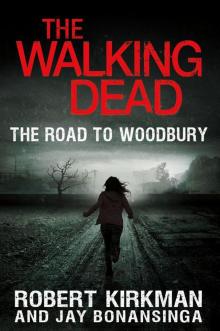 The Walking Dead: The Road to Woodbury
The Walking Dead: The Road to Woodbury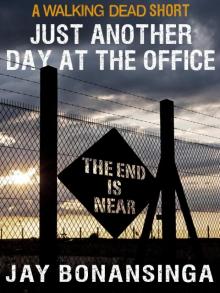 Just Another Day at the Office
Just Another Day at the Office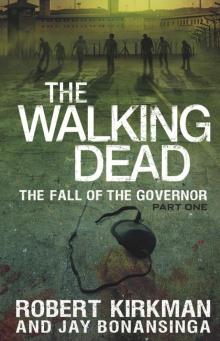 The Fall of the Governor: Part One
The Fall of the Governor: Part One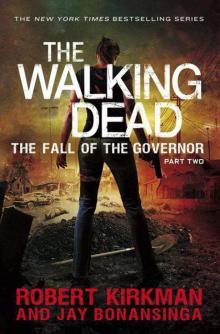 The Walking Dead: The Fall of the Governor: Part Two
The Walking Dead: The Fall of the Governor: Part Two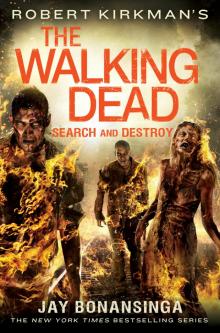 Search and Destroy
Search and Destroy Invasion
Invasion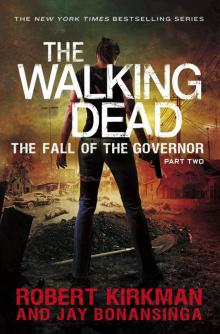 The Fall of the Governor: Part Two
The Fall of the Governor: Part Two The Walking Dead Collection
The Walking Dead Collection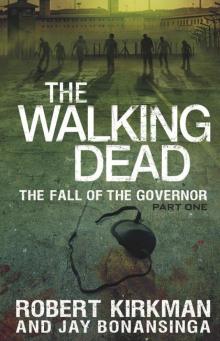 The Walking Dead
The Walking Dead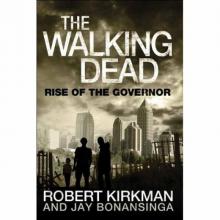 Descent
Descent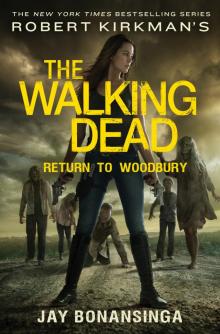 The Walking Dead: Return to Woodbury
The Walking Dead: Return to Woodbury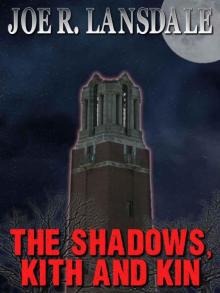 The Killer's Game
The Killer's Game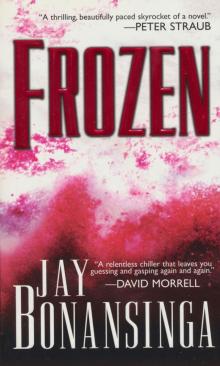 Frozen
Frozen Shattered
Shattered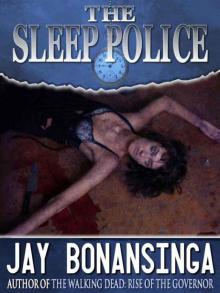 The Sleep Police
The Sleep Police Perfect Victim
Perfect Victim